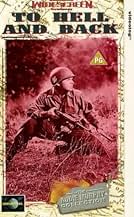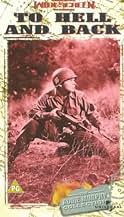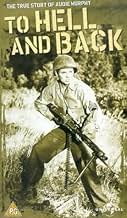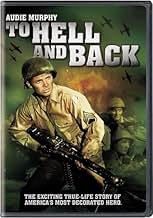IMDb RATING
7.1/10
6.3K
YOUR RATING
The true WWII story of Audie Murphy, the most decorated soldier in U.S. history. Based on the autobiography of Audie Murphy who stars as himself in the film.The true WWII story of Audie Murphy, the most decorated soldier in U.S. history. Based on the autobiography of Audie Murphy who stars as himself in the film.The true WWII story of Audie Murphy, the most decorated soldier in U.S. history. Based on the autobiography of Audie Murphy who stars as himself in the film.
- Awards
- 1 nomination total
- Director
- Writers
- All cast & crew
- Production, box office & more at IMDbPro
Featured reviews
I liked this movie not so much because it is a great movie ( it is an average war movie of this era) but because it made me reflect about reality versus perception and how you can be very wrong about something by taking it at face value. Let me explain. My perception, If I had to pick a platoon for battle I would never pick Audie Murphy. At 5'5", maybe 110 lbs, a high tinny voice, and hyper-kinetic motion, he seems more like someone that would get killed early and easily, or worse get you killed. The reality, he was the man you wanted in your platoon when the battle started. He was made of heroic stuff. He wasn't a tough talking braggart. He was just a soldier that would do anything to save his brothers and get home alive. He of course isn't the only example of this. He just got his own movie. It was a good thing that he was an actor because John Wayne would have played his part if he hadn't been, which would have been a real shame because you would have lost the true meaning behind the story. Hollywood prefers style over substance. It would have been a true
disservice to all of the short, underweight chirpy men in the world.
Think about Jimmy Stewart and John Wayne, who would you want in your platoon. John Wayne is your probable choice. Now compare Jimmy Stewart's military career with John Wayne's. John Wayne avoided WWII instead using it to advance his career when many of his contemporaries went to war. Jimmy Stewart on the other hand joined the Air Force 9 months before the attack on Pearl Harbor. He had to force the Air Force to let him in because he was under weight. He was a bomber pilot that flew 20 missions. "His wartime decorations included the Distinguished Flying Cross with Oak Leaf Cluster, four Air Medals, and the French Croix de Guerre with Palm." Now who do you want on your side. I'll take the battle hardened, frail looking, stuttering veteran over the tough talking, strapping, strutting Hollywood pretender any day.
So when I watch the movie I think about the reality of Audie Murphy. Which leaves me with the feeling that if you put your heart into it you can do anything. So when you watch the movie think about the reality. You have a 5'5" war hero that actually became a Hollywood action hero which is improbable in itself.
disservice to all of the short, underweight chirpy men in the world.
Think about Jimmy Stewart and John Wayne, who would you want in your platoon. John Wayne is your probable choice. Now compare Jimmy Stewart's military career with John Wayne's. John Wayne avoided WWII instead using it to advance his career when many of his contemporaries went to war. Jimmy Stewart on the other hand joined the Air Force 9 months before the attack on Pearl Harbor. He had to force the Air Force to let him in because he was under weight. He was a bomber pilot that flew 20 missions. "His wartime decorations included the Distinguished Flying Cross with Oak Leaf Cluster, four Air Medals, and the French Croix de Guerre with Palm." Now who do you want on your side. I'll take the battle hardened, frail looking, stuttering veteran over the tough talking, strapping, strutting Hollywood pretender any day.
So when I watch the movie I think about the reality of Audie Murphy. Which leaves me with the feeling that if you put your heart into it you can do anything. So when you watch the movie think about the reality. You have a 5'5" war hero that actually became a Hollywood action hero which is improbable in itself.
Quite often I see a movie then seek out the book but when I came to the US from Canada when I was 13 the first purchase I made was the paperback version of "To Hell and Back" ($0.35). Of course Audie Murphy is perfectly cast and gives a performance far superior to any of his subsequent movie roles. The others, notably Marshall Thompson, Jack Kelly, David Janssen and Art Aragon give satisfying performances. In many ways this was the "Saving Private Ryan" of its time for its "realistic" portrayal of the foot soldier in WW 2. Life magazine boosted the audience for this film when it put Murphy on the cover and emphasized that the story was true. I think that it works because Murphy doesn't look like the typical movie hero. The book is once again available in a new larger page-size paperback.
Let's face it; in a world of computers and egotists so far absent of true human contact and chivalry, Audie Murphy will forever shine brightly and ever brighter as a true man. He is perhaps the last real genuine American hero, as we slip into a vortex world of lawyers, statistics, and scams.
1.) At the age of 12, he chose to be a man by taking over his absentee father's role in his family; he literally fed his dirt poor family by putting meat on the table with a keen eye and a broken down .22 rifle. Working two jobs at this age, he still wrote cursively w/ excellent spelling and diction when he had to quit his education. This is something half of the high schoolers of today can't do as they "rap" themselves in hedonistic pursuits of clothes, breeding without responsibility, drugs, cell phones, and a disregard for another person's respect and rights.
2.) After multiple attempts to join our country's armed forces, he became the most highly decorated soldier in our nation's history, with countless feats of heroism (please see WWW.AUDIEMURPHY.COM.).
3.) He achieved Hollywood star status with his tough yet tender persona.
In a current world of 50 cents, we can look back to a time when a man was truly a man, and that man was the United States Medal of Honor Winner: AUDIE MURPHY.
1.) At the age of 12, he chose to be a man by taking over his absentee father's role in his family; he literally fed his dirt poor family by putting meat on the table with a keen eye and a broken down .22 rifle. Working two jobs at this age, he still wrote cursively w/ excellent spelling and diction when he had to quit his education. This is something half of the high schoolers of today can't do as they "rap" themselves in hedonistic pursuits of clothes, breeding without responsibility, drugs, cell phones, and a disregard for another person's respect and rights.
2.) After multiple attempts to join our country's armed forces, he became the most highly decorated soldier in our nation's history, with countless feats of heroism (please see WWW.AUDIEMURPHY.COM.).
3.) He achieved Hollywood star status with his tough yet tender persona.
In a current world of 50 cents, we can look back to a time when a man was truly a man, and that man was the United States Medal of Honor Winner: AUDIE MURPHY.
A largely ordinary film about an extraordinary man, To Hell And Back was made a decade after combat soldier Murphy left the service, a natural enough choice of subject matter. Based upon Murphy's book of reminiscences of the same name, the film was viewed as a useful tonic for recruitment after the Korean War by the Army and they co-operated enthusiastically with the studio's production.
After a briefly covering the actor's childhood, the rest of the movie focuses on Murphy's striking military career. With little effort to probe the psychology of its central character, it ends before his discharge. Director Jesse Hibbs does a competent piece of work but Murphy's uniqueness deserved better - someone like Aldrich, Siegel or Samuel Fuller, who around the same time was producing such work as The Steel Helmet and Fixed Bayonet! The cigar-chomping ex-infantryman brought to war projects an essential grit - as well as directorial flair - that's too often missing from To Hell And Back.
Hibbs' version of World War II, made conservatively and with the army looking over his shoulder, lacks the cynicism and bitter truths one can find elsewhere. Indeed a good deal of To Hell And Back, especially during the early parts, is relatively light-hearted. Turned down by the Marines and paratroopers for being underweight in real life, there's a suggestion at the start that Murphy was a little sickly - a poor start for a hero. Hence we see him suffering from sea-sickness on his way to his first combat zone, and then suffering a reaction from his inoculations which, we are told, has laid him up in bed for a week. So much so that his superiors consider sending away from the front line (a fact ruefully recalled later).
What's striking today about To Hell And Back is how ironic it is. Just as 'Murphy' the soldier initially seems an unlikely superhero, so Murphy the actor might be the last person you'd cast as himself (perhaps anticipating this, the star allegedly suggested Tony Curtis for the lead). Unlike the brawling, macho hero figures familiar to cinema audiences, Murphy is boyish and slight looking - young enough, even in 1955, to play himself as a youth. An unassuming if determined character, 'Murphy' is somewhat ill at ease with women (a trait, incidentally, not reflecting real life), one reason why perhaps the 'Italian interlude' of To Hell And Back, when the soldiers are on leave, is the least convincing of the narrative. He's an introspective, diffident character hardly marked out as a leader of men. And yet this is the man who, amongst other acts of extreme valour, stood up on a burning tank with a machine gun to keep the German advance at bay and destroyed several machine gun nests on his own. The man of whom the 3rd Infantry Commander in World War II called "the greatest combat soldier I have ever known" and another Major-General dubbed "beyond a doubt the finest soldier I have ever seen." There's interesting power occasionally in the film too, exactly because the actor's mild, everyman quality disavows those extreme qualities laying hidden below the baby-faced surface, even while the star's real life history affirms them. When Murphy weeps at the death of a newly fallen comrade, although it's just a short scene, the grief seems true and universal; in its modest way a testament to the courage and loss of all fighting men, and not just typical Hollywood emotional artifice. John Ford's work, to take one example, includes moving graveside scenes, but with the likes of poetically manufactured heroes Fonda and Wayne. None have such a unique impact as this.
Such a moment of introspection is unusual in To Hell And Back. Ending as it does with Murphy's war drawing to a close and a parade, understandably the film offers no portrait of the star's later years, decades when he faced stress-related nightmares, health issues, an amount of painkiller dependency and other personal issues. Interestingly at one point the star did consider a sequel to the film, tentatively entitled 'The Way Back', even going so far as reportedly writing a script in 1956, but this idea fell by the wayside.
Murphy, who never considered himself more than a competent actor, wears the mantle of great courage very lightly in his film, just as he did in real life (attempting to give his medals away to relatives for instance). One reason for this is perhaps the star's feelings towards the material. Although To Hell And Back was, unsurprisingly, his most successful film career-wise he admitted to a slackening of interest in events. After all, he'd already done them first hand and then revisited them during the writing of his book, so much so that he "got tired of reliving all these experiences." Murphy saw the purpose of the film as utilitarian as much as entertaining, showing newer infantry what it was really like just as much as pleasing the public. Perhaps the greatest irony of all is that the American military has apparently always preferred Wayne's much more dynamic Sands Of Iwo Jima over this film as classic entertainment for serving ranks.
Murphy won 33 military awards, including every medal of valour America gives, as well as the Legion de Honour and Belgian Croix de Guerre. By contrast his film, although financially successful, received far fewer accolades. Recently reissued in all its widescreen, colour glory and in a good print (if lacking any documentary support) it's still worth a look. For a less compromising view of war on foot, then the aforementioned Fuller is one place to start; for war's doomed romance you'd want to see Sirk's A Time To Live And A Time To Die. But To Hell And Back, with all flaws, is a sobering reminder of what a mighty real hero looks like.
After a briefly covering the actor's childhood, the rest of the movie focuses on Murphy's striking military career. With little effort to probe the psychology of its central character, it ends before his discharge. Director Jesse Hibbs does a competent piece of work but Murphy's uniqueness deserved better - someone like Aldrich, Siegel or Samuel Fuller, who around the same time was producing such work as The Steel Helmet and Fixed Bayonet! The cigar-chomping ex-infantryman brought to war projects an essential grit - as well as directorial flair - that's too often missing from To Hell And Back.
Hibbs' version of World War II, made conservatively and with the army looking over his shoulder, lacks the cynicism and bitter truths one can find elsewhere. Indeed a good deal of To Hell And Back, especially during the early parts, is relatively light-hearted. Turned down by the Marines and paratroopers for being underweight in real life, there's a suggestion at the start that Murphy was a little sickly - a poor start for a hero. Hence we see him suffering from sea-sickness on his way to his first combat zone, and then suffering a reaction from his inoculations which, we are told, has laid him up in bed for a week. So much so that his superiors consider sending away from the front line (a fact ruefully recalled later).
What's striking today about To Hell And Back is how ironic it is. Just as 'Murphy' the soldier initially seems an unlikely superhero, so Murphy the actor might be the last person you'd cast as himself (perhaps anticipating this, the star allegedly suggested Tony Curtis for the lead). Unlike the brawling, macho hero figures familiar to cinema audiences, Murphy is boyish and slight looking - young enough, even in 1955, to play himself as a youth. An unassuming if determined character, 'Murphy' is somewhat ill at ease with women (a trait, incidentally, not reflecting real life), one reason why perhaps the 'Italian interlude' of To Hell And Back, when the soldiers are on leave, is the least convincing of the narrative. He's an introspective, diffident character hardly marked out as a leader of men. And yet this is the man who, amongst other acts of extreme valour, stood up on a burning tank with a machine gun to keep the German advance at bay and destroyed several machine gun nests on his own. The man of whom the 3rd Infantry Commander in World War II called "the greatest combat soldier I have ever known" and another Major-General dubbed "beyond a doubt the finest soldier I have ever seen." There's interesting power occasionally in the film too, exactly because the actor's mild, everyman quality disavows those extreme qualities laying hidden below the baby-faced surface, even while the star's real life history affirms them. When Murphy weeps at the death of a newly fallen comrade, although it's just a short scene, the grief seems true and universal; in its modest way a testament to the courage and loss of all fighting men, and not just typical Hollywood emotional artifice. John Ford's work, to take one example, includes moving graveside scenes, but with the likes of poetically manufactured heroes Fonda and Wayne. None have such a unique impact as this.
Such a moment of introspection is unusual in To Hell And Back. Ending as it does with Murphy's war drawing to a close and a parade, understandably the film offers no portrait of the star's later years, decades when he faced stress-related nightmares, health issues, an amount of painkiller dependency and other personal issues. Interestingly at one point the star did consider a sequel to the film, tentatively entitled 'The Way Back', even going so far as reportedly writing a script in 1956, but this idea fell by the wayside.
Murphy, who never considered himself more than a competent actor, wears the mantle of great courage very lightly in his film, just as he did in real life (attempting to give his medals away to relatives for instance). One reason for this is perhaps the star's feelings towards the material. Although To Hell And Back was, unsurprisingly, his most successful film career-wise he admitted to a slackening of interest in events. After all, he'd already done them first hand and then revisited them during the writing of his book, so much so that he "got tired of reliving all these experiences." Murphy saw the purpose of the film as utilitarian as much as entertaining, showing newer infantry what it was really like just as much as pleasing the public. Perhaps the greatest irony of all is that the American military has apparently always preferred Wayne's much more dynamic Sands Of Iwo Jima over this film as classic entertainment for serving ranks.
Murphy won 33 military awards, including every medal of valour America gives, as well as the Legion de Honour and Belgian Croix de Guerre. By contrast his film, although financially successful, received far fewer accolades. Recently reissued in all its widescreen, colour glory and in a good print (if lacking any documentary support) it's still worth a look. For a less compromising view of war on foot, then the aforementioned Fuller is one place to start; for war's doomed romance you'd want to see Sirk's A Time To Live And A Time To Die. But To Hell And Back, with all flaws, is a sobering reminder of what a mighty real hero looks like.
10valf
To Hell And Back rates as one of the truly classic and unique movies of our time. To have Audie Murphy himself have to remember and "relive" his war experiences, having been removed from them for only ten years, is unprecedented.The movie is the forerunner of such movies as We Were Soldiers Once...and Black Hawk Down. Although Col. Tom Moore was only an on scene adviser he also relived some of the scenes(his own admission) that were depicted in "..Soldiers..." Black Hawk Down depicted actual footage of the battle. The historical and personal accuracy of these movies is tremendous. Audie, however paid a bitter price. His war experiences tormented him the rest of his life with constant insomnia, depression and anxiety. I was lucky enough to meet him at Suffolk Downs Race Track in 1959 or 1960. I always wondered what became of his siblings and sister. Audie Murphy is a true hero of the twentieth century. Everyone should take note of what true character, integrity and loyalty Audie gave us. Thank you Audie.
Did you know
- TriviaA total of 50,000 rounds of ammunition, 300 pounds of TNT, 600 pounds of blasting powder and ten cases of 40% dynamite were required for the filming of the battle scenes.
- GoofsDuring Audie Murphy's Medal of Honor ceremony at the end of the movie, the narrator makes two mistakes as he describes the other decorations for valor that Murphy received: he mentions "a Bronze Star Medal" (Murphy actually received two BSM's); and "a Bronze Star Medal with bronze service arrowhead" (the correct award is the European-African-Middle Eastern Campaign Medal with Bronze Service Arrowhead). The narrator also omits two significant awards that Murphy earned: two Presidential Unit Citations and the Combat Infantryman's Badge.
- Alternate versionsWest German theatrical version was cut by approx. 5 minutes.
- ConnectionsEdited into The Young Warriors (1967)
Details
- Runtime
- 1h 46m(106 min)
- Aspect ratio
- 2.55 : 1
Contribute to this page
Suggest an edit or add missing content







































